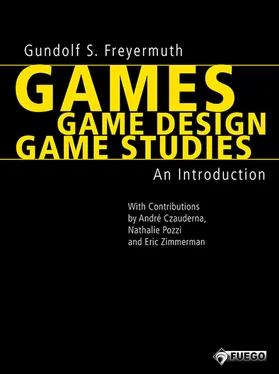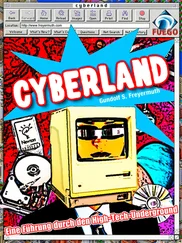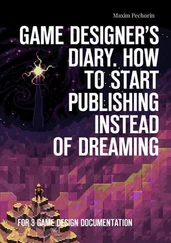1 ...7 8 9 11 12 13 ...17 8Ibid., loc. 1281.
9Ibid., loc. 400.
10Ibid., loc. 98.
11Ibid., loc. 311 and loc. 578.
12Schell, Jesse: The Art of Game Design , loc. 1079.
13Ibid., loc. 1149.
14Egenfeldt-Nielsen et al.: Understanding Video Games , loc. 1095; Mäyrä: An Introduction to Game Studies , loc. 580.
15The necessity of an historical analysis of ahistorical-systematic attempts at definition is stressed by Mäyrä: An Introduction to Game Studies , loc. 550.
16See Egenfeldt-Nielsen et al.: Understanding Video Games , loc. 1112: “... the definitions say nothing about digital computation and thus are definitions of games and not merely video games.”
17See, for example, Juul: Half-Real , loc. 103: “[T]he history of video games is partly about breaking with the classic game model.”
18Ibid., loc. 63: Juul also sees digital games as explicitly outside of the tradition of “cinema, print literature, or new media.”
19Salen/Zimmerman: Rules of Play , loc. 1358.
20Mäyrä, Frans: An Introduction to Game Studies , loc. 715.
21Ibid., loc. 691.
22Ibid., loc. 812.
23Mersch, Dieter: "Logik und Medialität des Computerspiels. Eine medientheoretische Analyse", in: Distelmeyer, Jan/Hanke, Christine/Mersch, Dieter (ed.), Game over!?: Perspektiven des Computerspiels , Bielefeld: transcript 2008, pp. 19-41, here p. 20.
24Ibid., p. 35.
25In regard to analog games, Mersch says: “While it’s true that classical forms of play can be as well reduced to operators in decision logic and thereby mathematized as chess computers demonstrate, decision logic is not constitutive for many game situations—I should like to mention children’s games, competitions, ritualized forms of play, sports etc.” (Ibid., p. 37) Thereby the question remains what sort of relationship should arise between digital and analog games, i.e., between the two “kinds” of analog games: those, which like digital games are bound by “logical decision making operators,” and those, which remain independent of them.
26See Bergo, Bettina: “Emmanuel Levinas,” Stanford Encyclopedia of Philosophy , August 3, 2011; http://plato.stanford.edu/entries/levinas/. {Bergo, 2011 #3246}{Bergo, 2011 #3246}{Bergo, 2011 #3246}{Bergo, 2011 #3246}See also Lévinas, Emmanuel: “The Philosopher and Death,” in: (ed.), Alterity and Transcendence , New York: Columbia University Press 1999, pp. 153-168.
27See Reynolds, Jack: “Jacques Derrida (1930-2004),” Internet Encyclopedia of Philosophy – A Peer-Reviewed Academic Source ; http://www.iep.utm.edu/derrida/; Derrida, Jacques: Mémoires: for Paul de Man , New York: Columbia University Press 1986.
28See Baudrillard, Jean/Lotringer, Sylváere: The Ecstasy of Communication , Brooklyn N.Y.: Autonomedia 1988. For Baudrillard, in the end the object and above all machines remain as the “radical Other”: “the inhuman alterity of an intelligent device [...] artificial alterity” (Baudrillard, Jean/Guillaume, Marc: Radical Alterity , Los Angeles, CA; Cambridge, Mass.; London: Semiotext(e); Distributed by the MIT Press 2008, p. 110.
29Butler, Judith: Bodies that Matter: On the Discursive Limits of “Sex,” Abingdon, Oxon; New York, NY: Routledge 2011 (*1993). Butler introduced the term “constitutive outside” to the context of the development of the medium: “The exclusionary matrix by which subjects are formed thus requires the simultaneous production of a domain of abject beings, those who are not yet ‘subjects,’ but who form the constitutive outside to the domain of the subject.” (Ibid., p. xiii)
2 Games in the Modern Era. A Short Media History
Games are media, this much seems indisputable. Still, it is seldom attempted to situate analog or digital games in the context of the history and theory of media. Quite clearly, however, digital games are positioned in the continuity of modern audiovisuality. 1In particular, they are the latest step in the process of the steady rationalization of image and sound production aimed at perspectival realism that began in the Renaissance. As photography, film, and video did before, digital games have made this process faster, simpler, and cheaper: It started with painterly realism, moved to photorealism and now has reached hyperrealism: from Alberti’s perspectival window view—“una finestra aperta” 2—, which had to be manually constructed with great effort, to analog photography, which semi-automated the production of still and moving pictures, to real-time image generation via 3D engines. Just as the industrial media of film and television did not signify a radical break from the preindustrial medium of theater, but rather continued its aesthetic interests in numerous ways on a higher technological level—for instance the optical functionalization of the gaze or the century-long striving for an audiovisual synthesis, a total work of art—, in the same way current digital forms of play are more than just distantly related to older forms of media such as theater, film, and television.
GAMES
In fact, historically speaking, games have been around far longer than all other forms of audiovisual representation. They are, as Chris Crawford argues in his “Phylogeny of Play,” older than mankind. 3Many animal species simulate real world movements and actions, such as hunting, in order to practice them in relative safety. To play in such a manner and to go beyond and develop more complex, rule-governed games appears to also be a fundamental tendency of Homo sapiens. Board games such as SENET (Egypt, 3100 BCE) or the ROYAL GAME OF UR (Sumer, 2600 BCE) belong to the earliest evidence of human culture. In 5th century BCE, the Greek historian Herodot described how, supposedly, 700 years earlier the Lydians in Asia Minor, who are also credited with the invention of money, survived long periods of starvation through the use of board, dice, and many other games and then finally, with one last game, found a solution that insured the survival of the entire community. 4The game design theoretician Jane McGonigal speculates about the future of digital games by appealing to the historical function of analog games:
“When Herodotus looked back, he saw games that were large-scale systems, designed to organize masses of people and make an entire civilization more resilient. I look forward to a future in which massively multiplayer games are once again designed in order to reorganize society in better ways, and to get seemingly miraculous things done.” 5
Such positive use and valuation of games correlates with equally continuous, fundamental criticism and recurring attempts at banning them. Frans Mäyrä speaks of the “continuous history of bans or restrictions on games playing.” 6In the western and Christian-influenced modern era they range from the numerous attempts by British kings between the 14th and 16th century to ban soccer, to the ban of pinball machines in New York from the 1930s to the 1970s, all the way to the present, constantly flaring up cries to ban violent videogames. From a historical perspective, Jesper Juul writes, “the current preoccupation with the assumed dangers of video games is a clear continuation of a long history of regulation of games as such …” 7The culture war surrounding play and specific forms of games shapes the social framework for the theoretically-oriented media history of games in the modern era, which I will attempt to outline in this chapter.
The categorical framework I will apply goes back to Harry Pross’s study on media research from the 1970s. 8In it Pross identifies different medialities in accordance with “the apparatus of the messaging system,” 9i.e., in accordance with the extent to which technology is implemented and used. However, since the availability of technologies and of techniques is subject to constant change in different cultures, Pross’s approach has the advantage of operating both systematically and historically at the same time. Thereby his theory of mediality allows for the understanding of the history of media as a process of progressive accumulation and differentiation.
Читать дальше











